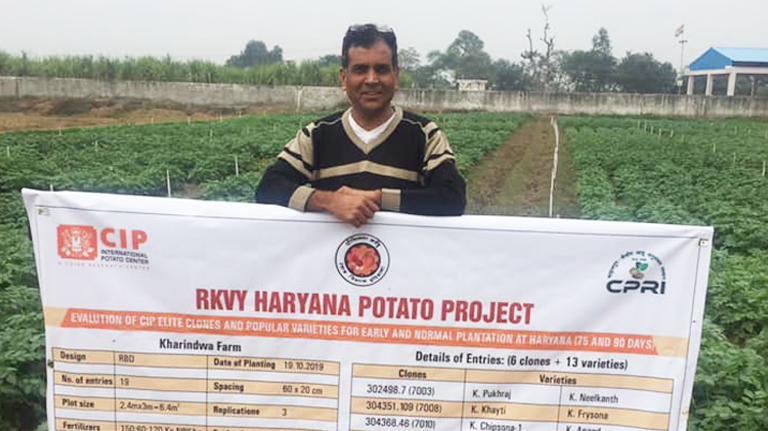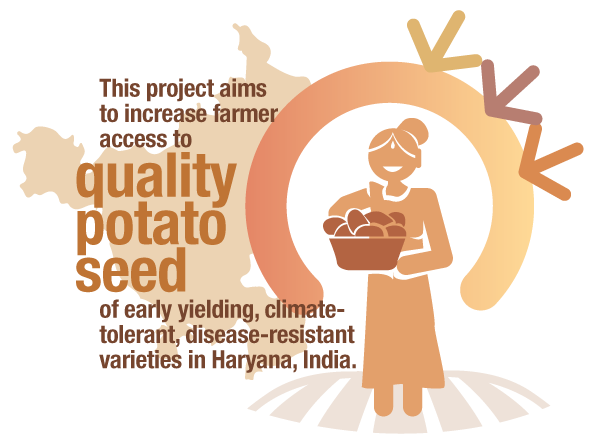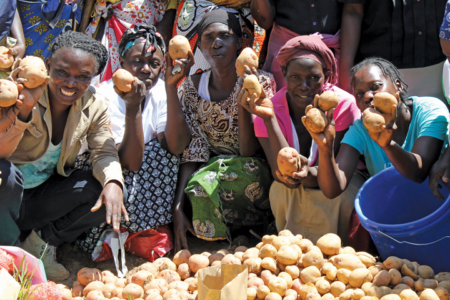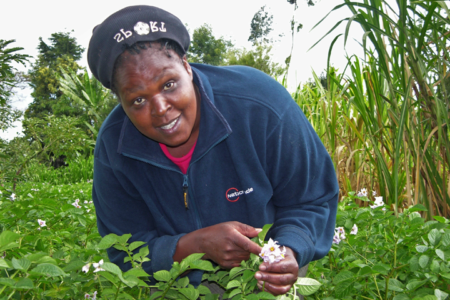
Quality seed potato production using aeroponics and a selection of short-duration varieties.
This project aims to increase farmer access to early-yielding, heat- and virus-resistant varieties of potato, to promote sustainable intensification of production and boost nutrition, incomes and food security throughout Haryana, India.
Background
Potato has unexplored potential to contribute to nutrition, incomes, and food security among the poor and malnourished in India. In response, India aims to increase its potato yields significantly over the next 30 years. However, conventional field methods of potato seed production have low multiplication rates and promote accumulation of pathogens, resulting in poor subsequent yields. At the same time, clean laboratory-based seed production technologies are relatively expensive and time-consuming. These two factors act a major constraint to increasing potato productivity.
This project proposes to increase rates of production of quality planting materials using an aeroponics system, growing tubers in a nutrient medium with no soil. This system has several advantages over conventional field and tissue culture techniques. For one, aeroponics require little space and use far less water, producing a high yield of roots that are free from soil-borne diseases weeds, and nematodes (roundworms). Two, this system allows a longer growth phase and permits more efficient harvesting. Thus, aeroponic production of early-yielding varieties that tolerate the increased temperatures and virus attacks associated with climate change is an ideal solution for sustainable intensification of potato production in Haryana.
Objectives
This project aims to increase farmer access to quality potato seed of early yielding, climate-tolerant, disease resistant varieties by fulfilling the following objectives:
- To select and multiply early-yielding varieties with good tolerance to heat and viruses;
- To disseminate these varieties to farmers along with knowledge on good production practices;
- To establish an aeroponics unit to produce mini-tubers for dissemination; and
- To evaluate the aeroponics system and set standards for its continued use.
Approach
Working with farmers and other stakeholders through participatory variety selection trials, the International Potato Center (CIP) and partner scientists will select suitable potato varieties for multiplication and dissemination. A team from the Haryana Institute of Horticulture will then develop a strategy to promote seed production by both farmers and specialized seedproducing enterprises.
Work in the field will continue by engaging with farmers to develop more sustainable and efficient production practices, including water-saving techniques and pest and disease management strategies. Diagnostic surveys will help improve understanding of pre- and post-harvest losses and how they may be minimized. The project will also help establish public-private partnerships for contract farming and value addition, including the development of prototype potato products and processing technologies.
In addition, Potato Technology Centre staff in Shamgarh Karnal will receive training on aeroponic production and other technologies related to producing clean potato planting materials. The team will then develop a standard protocol to produce mini-tubers, establishing optimal conditions for nutrient supply and comparing aeroponics system performance with conventional micropropagation methods.
Expected outcomes
Promoting sustainable intensification of production will benefit food security, encourage more healthy diets, and increase incomes throughout Haryana. Setting up an aeroponics system is expected to enhance the production of mini-tubers, helping Haryana to become self-sufficient in the production of quality potato seed.
The new short-duration climate-proof varieties will allow farmers to plant at suitable times to complement conventional rice and wheat growing seasons, generating high yields relatively quickly. The new varieties will be selected for high dry matter and low sugar content, making them more suitable for processing and other value-addition purposes.
Improving market links are expected to strengthen the entire potato value chain, creating additional employment opportunities and raising incomes among a wide group of stakeholders. Additional income may be gained by farmers and seed enterprises by selling seed potatoes in neighboring states where there is likely to be unmet demand for quality planting materials.
| Key outcome | Targets |
| Potato productivity increase | 10% |
| Farmer incomes increase | 10% |
| Farmers producing quality seed of new varieties | 600 |
Contact
Samarendu Mohanty
CIP, India
s.mohanty@cgiar.org
Thanks to our donors





